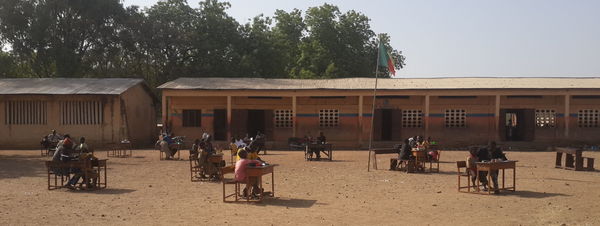The Notre Dame Initiative for Global Development (NDIGD) recently completed a baseline study for the Catholic Relief Services, Benin (CRS Benin) Food For Education Project.
In 2014 CRS Benin, in partnership with World Education, Inc. (WEI) began implementing “CRS Food For Education,” a four-year project in the Alibori and Borgou Departments of northeastern Benin. The project aims to improve the quality of education and the general learning environment for over 38,000 primary school-aged children attending 141 schools throughout northeastern Benin. Specific areas targeted for improvement include students’ literacy levels, attentiveness, and attendance.

Funded by the U.S. Department of Agriculture (USDA), Food for Education has an explicit focus on community engagement, containing programs that will improve and increase the knowledge of health and hygiene practices, safe food preparation, and nutrition, as well as access to preventative health interventions, water, and sanitation services. The project also aims to increase government capacity and ownership by working with the Ministry of Education’s National Institute for Training and Research in Education (Institute National pour la Formation et la Recherche en Education – INFRE).
NDIGD used both qualitative and quantitative methods to provide a baseline study. The baseline study included all information necessary to understand the starting point for students, parents, teachers, and principals in the intervention areas. As part of the baseline study, portions of an Early Grade Reading Assessment (EGRA) was conducted to test students’ abilities in first and second grades. Key informants within the school districts were interviewed, and questionnaires and focus group interviews were conducted, to ensure thorough and comprehensive data. Other components of the baseline study include food security surveys to understand dietary deficiencies within communities, and classroom observations to understand students’ attention levels, as project designers have hypothesized that a lack of nutrition leads to poor attention in the classroom.
NDIGD Monitoring and Evaluation Director, Juan Carlos Guzman, worked closely with CRS on the project. “This baseline study provides the information necessary to understand not only the students’ current situation in the target improvement communities, but also collects similar information from comparison schools in two neighboring communities. This will allow CRS to determine the students’ progress as a result of program activities in target schools by measuring their progress against the baseline. We will also able to assess the impact of the program by comparing student progress to that in comparison schools that have not received the intervention.”
The Benin Food for Education Project will continue through 2018. A mid-term and a final assessment will be taken at the conclusion of the project, to provide end line data for an impact evaluation.
An integral part of the University’s Keough School of Global Affairs, NDIGD works to promote human dignity through applied research, assessment, monitoring, evaluation, and training. The Keough School, scheduled to open in August 2017, will prepare students for effective and ethically grounded professional leadership in government, the private sector and global civil society, engaging them in the worldwide effort to address the greatest challenges of our century.